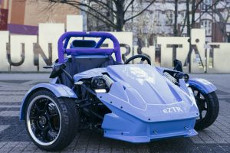Information about the degree course
The content of the Studies
The bachelor's programme in electromobility is a university course of study which provides a broad basic knowledge of electrical engineering and mechanical engineering on a mathematical and scientific basis, whereby electromobility is considered in the holistic system approach of complex electromobility concepts and implementations, taking sustainable mobility concepts into account. Students will be able to acquire detailed specialist knowledge through a wide range of electives. They will be able to work independently using scientific methods in order to master the demanding and complex tasks in their future field of electromobility.
Students acquire the skills to critically question opinions in their field of study, to solve problems in a scientifically structured way, taking into account related disciplines, and to represent their solution. They are able to acquire new knowledge for themselves.
Structure of the studies
graduation:Bachelor of Science (B.Sc.) standard period of study:6 Semesters start of studies:Wintersemester restricted admission:no N.C. admission requirement:Higher education entrance qualification (e.g. Abitur) application period: application with German school-leaving certificate at the OVGUSeptember 15th application with international school-leaving certificate over uni-assist July 15th teaching language:german
This program is divided into compulsory and elective modules. In addition, participation in a research project and industrial internship as well as the bachelor thesis are mandatory. The contents of the courses are directly related to current research topics. The bachelor's degree qualifies students to continue their studies in the consecutive four-semester master's programme. Their Master of Science (M.Sc.) degree is equivalent to the previously awarded academic degree of Diplomingenieur (Dipl.-Ing.).
Further information on the exact content and structure of the study programme can be found in the current study documents:
![]() Study Regulations
Study Regulations![]() Examination Regulations
Examination Regulations![]() Internship Regulation
Internship Regulation![]() Module Handbook
Module Handbook
Necessary knowledge / experience / interests
Solid knowledge of mathematics and natural sciences is required, as well as the ability to acquire mathematical and scientific knowledge and approaches and to apply them to technical problems.
Career opportunities
Engineers currently work in all industrial and service sectors, in classical electrical engineering, in automotive engineering and mechanical engineering. Graduates can take thereby on tasks in research and development as well as in production, sales and management. In addition, there is the possibility of becoming self-employed in the following areas: Electrical engineering, measurement and sensor technology, information and communication technology, automotive industry, traffic engineering, mechanical engineering, chemical industry.

